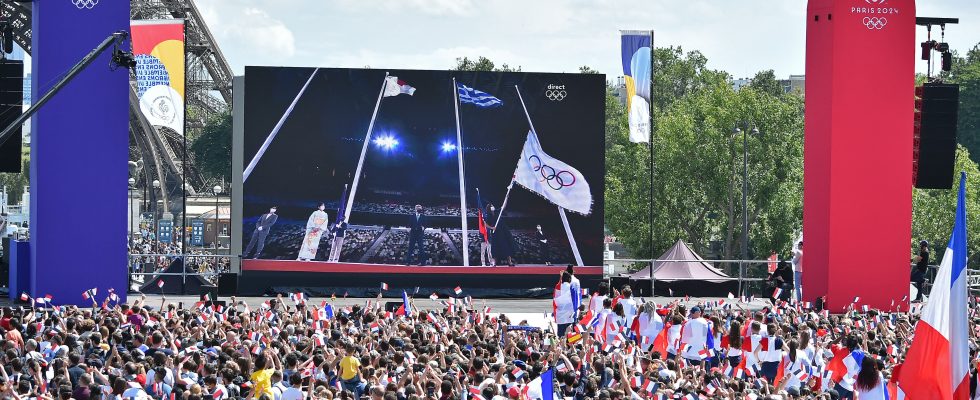More than 10,000 athletes, 45,000 volunteers, 12 million spectators and 25,000 journalists. The figures are known, they are dizzying. With such a mass of visitors gathered for two short festive weeks in Paris and Ile-de-France, the question of health risk arises during the Olympic Games. Crowd movements, food poisoning, storms, heat waves, viral or bacterial diseases: the Directorate General of Health indicates that it has listed around forty hazards with possible repercussions on the health of participants.
With the succession of epidemics in recent years (Covid, monkey pox, RSV, flu, etc.), infections are particularly worrying. Historically, however, major sporting events have rarely been marked by significant episodes of communicable diseases. There were 61 cases of norovirus infection, which causes gastroenteritis, on the sidelines of the 2006 World Cup in Germany, and 82 cases of measles at the Vancouver Winter Olympics in Canada in 2010. Norovirus had also circulated during the Winter Olympics in China in 2018 (41 cases).
But overall, no large-scale spread of pathogens has ever been reported until now in the context of sports gatherings. The only notable exception is the 2021 Euro football tournament: “Several teams of scientists have shown that it had contributed to the spread of Sars-CoV-2, in particular of the Delta variant”, recalls Mircea Sofonea, associate professor of epidemiology at the University of Montpellier. The 2021 Tokyo Olympics did not contribute to restarting the circulation of the coronavirus, but they took place in special conditions, almost behind closed doors, without spectators. But even in 2016, when the whole world was worried that the Summer Olympics were being held in Brazil in the midst of a Zika epidemic, nothing happened. No cases were declared among participants and visitors, either on site or upon their return to their countries.
Tiger mosquitoes, well established in Ile-de-France
“This time, the context is different”, notes however Professor Brigitte Autran, immunologist and president of Covars, the committee for monitoring and anticipation of health risks. Covid is still circulating, monkeypox has not completely disappeared. “If we take the example of dengue fever, epidemics are growing year after year globally, and there is today a significant risk that infected people will arrive and become a potential source of contamination,” continues Professor Autran. A threat taken all the more seriously as tiger mosquitoes, vectors of this virus, now colonize almost the entire territory, and are particularly well established in Ile-de-France.
“No one of course expects a devastating epidemic like in Brazil in recent weeks, but the threat increases from year to year,” underlines Brigitte Autran. The specialist also warns of the risk that visitors from the southern hemisphere will bring the flu virus with them, since this part of the planet will then be in the middle of an epidemic period at this time of year. “With the mixing of populations and promiscuity, all conditions will be met for pathogens to spread favorably, here in France, even if, for pathogens associated with longer incubation periods, diseases will only appear when visitors return home”, confirms Mircea Sofonea.
Other infectious disease specialists appear less concerned. “During the 1998 World Cup, the authorities asked the Sentinels network, which I was in charge of, to work on risk prevention and monitoring. We thought then that the risk of emergence was high, but we did not “had seen nothing, and on the contrary, we had even recorded a drop in consultations for viral infections”, says for example Professor Antoine Flahault, now director of the Institute of Global Health at the University of Geneva (Switzerland). .
Sporadic cases
The threat posed by dengue also seems limited, because mosquito populations remain much lower in our latitudes than in intertropical regions. “There could be some sporadic contaminations, or even small clusters of indigenous cases, as we see regularly now. All this could happen, but without taking on significant proportions,” specifies the epidemiologist.
As for infectious respiratory diseases, the hot season is hardly conducive to them anyway. “In reality, the Olympics do not change much in the situation in Paris in the summer, there are still millions of visitors who come from all over the world. They will perhaps be a little more numerous, but the risk of transmission of respiratory diseases will probably not even reach that which we experience in winter”, adds Professor Renaud Piarroux, epidemiologist and head of department at Assistance Publique Hôpitaux de Paris.
The authorities are preparing to deploy numerous means of surveillance, including in wastewater, so as to be able to very quickly discover which microbes are circulating in the population, and act accordingly to contain them. But there are other kinds of viruses that worry experts: computer viruses. The risk of seeing a large-scale attack paralyze the information systems of Assistance Publique – Hôpitaux de Paris is taken very seriously. Protocols have already been put in place to deal with this: WhatsApp groups to maintain communication between departments, procedures for disconnecting electronic devices from networks without having to unplug them completely, preparation to work in degraded mode, not to mention of course the measures to strengthen the level of IT security. Because a successful attack while Paris will focus the attention of the whole world would probably be just as devastating for public health and the image of France as a cluster of a few cases of infectious diseases…
.
